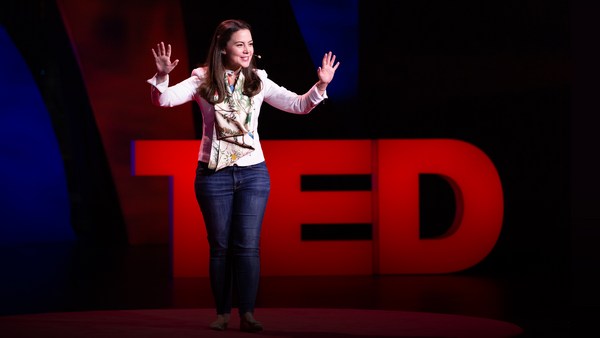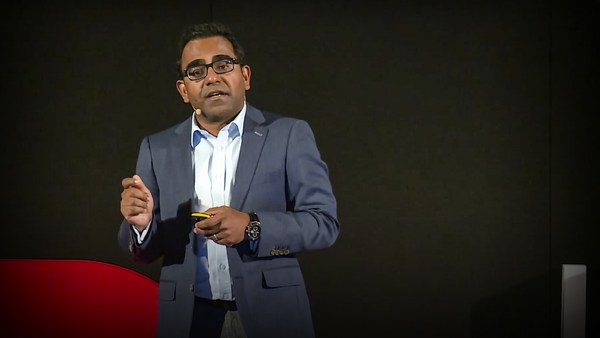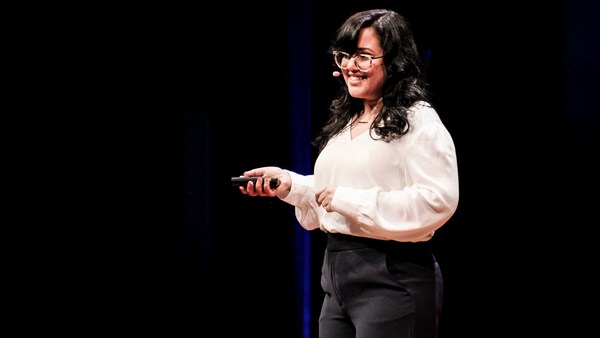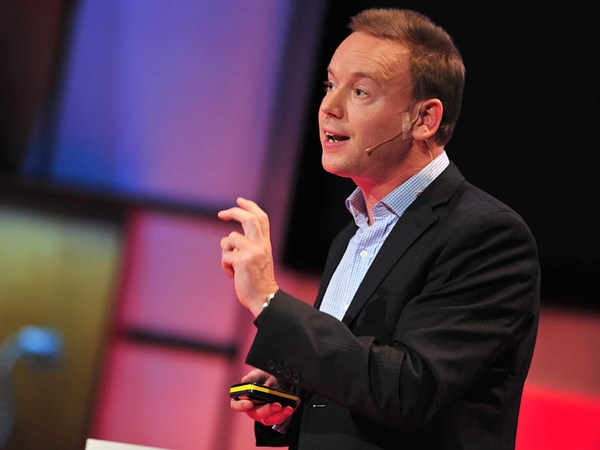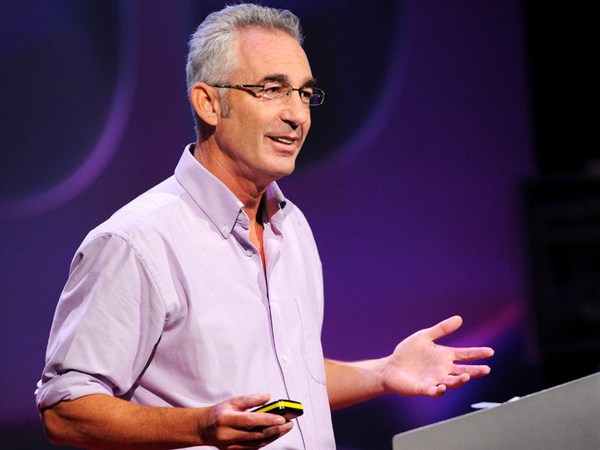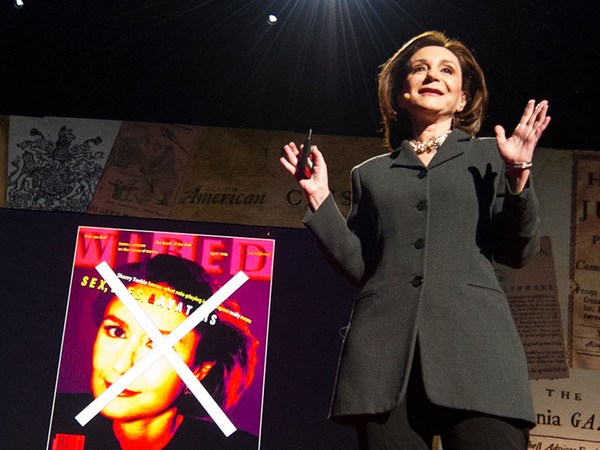Three planes, 25 hours, 10,000 miles. My dad gets off a flight from Australia with one thing in mind and it's not a snack or a shower or a nap. It's November 2016 and Dad is here to talk to Americans about the election. Now, Dad's a news fiend, but for him, this is not just red or blue, swing states or party platforms. He has some really specific intentions. He wants to listen, be heard and understand.
And over two weeks, he has hundreds of conversations with Americans from New Hampshire to Miami. Some of them are tough conversations, complete differences of opinions, wildly different worldviews, radically opposite life experiences. But in all of those interactions, Dad walks away with a big smile on his face and so does the other person. You can see one of them here. And in those interactions, he's having a version of what it seems like we have less of, but want more of -- a constructive conversation.
We have more ways than ever to connect. And yet, politically, ideologically, it feels like we are further and further apart. We tell pollsters that we want politicians who are open-minded. And yet when they change their point of view, we say that they lacked conviction. For us, when we're confronted with information that challenges an existing worldview, our tendency is not to open up, it's to double down. We even have a term for it in social psychology. It's called belief perseverance. And boy, do some people's beliefs seem to persevere.
I'm no stranger to tough conversations. I got my start in what I now call productive disagreement in high school debate. I even went on to win the World Schools Debate Championship three times. I've been in a lot of arguments, is what I'm saying, but it took watching my dad on the streets of the US to understand that we need to figure out how we go into conversations. Not looking for the victory, but the progress.
And so since November 2016, that's what I've been doing. Working with governments, foundations, corporations, families, to uncover the tools and techniques that allow us to talk when it feels like the divide is unbridgeable. And constructive conversations that really move the dialogue forward have these same three essential features.
First, at least one party in the conversation is willing to choose curiosity over clash. They're open to the idea that the discussion is a climbing wall, not a cage fight, that they'll make progress over time and are able to anchor all of that in purpose of the discussion. For someone trained in formal debate, it is so tempting to run headlong at the disagreement. In fact, we call that clash and in formal argumentation, it's a punishable offense if there's not enough of it. But I've noticed, you've probably noticed, too, that in real life that tends to make people shut down, not just from the conversation, but even from the relationship. It's actually one of the causes of unfriending, online and off.
So instead, you might consider a technique made popular by the Hollywood producer Brian Grazer, the curiosity conversation. And the whole point of a curiosity conversation is to understand the other person's perspective, to see what's on their side of the fence. And so the next time that someone says something you instinctively disagree with, that you react violently to, you only need one sentence and one question: “I never thought about it exactly that way before. What can you share that would help me see what you see?” What's remarkable about curiosity conversations is that the people you are curious about tend to become curious about you. Whether it's a friendly Australian gentleman, a political foe or a corporate rival, they begin to wonder what it is that you see and whether they could see it to.
Constructive conversations aren't a one-shot deal. If you go into an encounter expecting everyone to walk out with the same point of view that you walked in with, there's really no chance for progress. Instead, we need to think about conversations as a climbing wall to do a variant of what my dad did during this trip, pocketing a little nugget of information here, adapting his approach there. That's actually a technique borrowed from formal debate where you present an idea, it's attacked and you adapt and re-explain, it's attacked again, you adapt and re-explain. The whole expectation is that your idea gets better through challenge and criticism.
And the evidence from really high-stakes international negotiations suggests that that's what successful negotiators do as well. They go into conversations expecting to learn from the challenges that they will receive to use objections to make their ideas and proposals better. Development is in some way a service that we can do for others and that others can do for us. It makes the ideas sharper, but the relationships warmer. Curiosity can be relationship magic and development can be rocket fuel for your ideas.
But there are some situations where it just feels like it's not worth the bother. And in those cases it can be because the purpose of the discussion isn't clear. I think back to how my dad went into those conversations with a really clear sense of purpose. He was there to learn, to listen, to share his point of view. And once that purpose is understood by both parties, then you can begin to move on. Lay out our vision for the future. Make a decision. Get funding. Then you can move on to principles.
When people shared with my dad their hopes for America, that's where they started with the big picture, not with personality or politics or policies. Because inadvertently they were doing something that we do naturally with outsiders and find it really difficult sometimes to do with insiders. They painted in broad strokes before digging into the details.
But maybe you live in the same zip code or the same house and it feels like none of that common ground is there today. Then you might consider a version of disagreement time travel, asking your counterpart to articulate what kind of neighborhood, country, world, community, they want a year from now, a decade from now. It is very tempting to dwell in present tensions and get bogged down in practicalities. Inviting people to inhabit a future possibility opens up the chance of a conversation with purpose.
Earlier in my career, I worked for the deputy prime minister of New Zealand who practiced a version of this technique. New Zealand's electoral system is designed for unlikely friendships, coalitions, alliances, memoranda of understanding are almost inevitable. And this particular government set-up had some of almost everything -- small government conservatives, liberals, the Indigenous people's party, the Green Party. And I recently asked him, what does it take to bring a group like that together but hold them together? He said, "Someone, you, has to take responsibility for reminding them of their shared purpose: caring for people.” If we are more focused on what makes us different than the same, then every debate is a fight. If we put our challenges and our problems before us, then every potential ally becomes an adversary.
But as my dad packed his bags for the three flights, 25 hours, 10,000 miles back to Australia, he was also packing a collection of new perspectives, a new way of navigating conversations, and a whole set of new stories and experiences to share. But he was also leaving those behind with everyone that he'd interacted with. We love unlikely friendships when they look like this. We've just forgotten how to make them. And amid the cacophony of cable news and the awkwardness of family dinners, and the hostility of corporate meetings, each of us has this -- the opportunity to walk into every encounter, like my dad walked off that plane, to choose curiosity over clash, to expect development of your ideas through discussion and to anchor in common purpose. That's what really world-class persuaders do to build constructive conversations and move them forward. It's how our world will move forward too.
Thank you.
